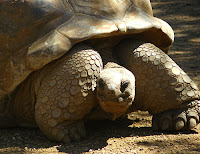Sudan's Wildlife Undiscovered
Before the wars and instability that Sudan has known since its 'independence' from the British and then the Egyptians, the country must have had a fascinating, abundant and a variety of wildlife. With its vast green plains, rivers and swamps - elephants, rhinos, lions, buffaloes, leopards, cheetahs, birds and many other animals, must have roamed in many parts of the country. Presently, not many wild animals are left in the North; Southern Sudan, still has abundant wildlife. The deep swamps of the Sudd, is abundant with wildlife like the white-eared kob and Nile lechwe (Kobus megaceros). Nobody seems to know the true numbers and distribution of Sudan's wildlife. With the country now settling down, both in the North and the South - studies can now be undertaken on this. Today, there are four known national parks in the Sudan : Dinder , Nimule, Southern and Sanganeb ; Sanganeb and Dungonab on the Red Sea, are said to contain some of the best and most unspoiled coral ree...


